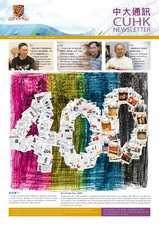It's an accepted fact that the civil servants’ code of conduct is something that requires regular review. But in fact this is nothing new. As early as the Qin Dynasty (221–206 BC), the principles governing civil servants’ behaviour and performance had already been clearly listed out. Reading them, one discovers that some of the themes we deem important have not been changed for over 2,200 years.
The Bamboo Slips of the Qin Dynasty Kept in the Yuelu Academy contains the text, How to Be an Official for the Common People, which lists the ‘five rights’ and ‘five wrongs’. The ‘five rights’ an official should abide by are: ‘Be loyal and respectful to his superior; be upright and do not slander; handle matters appropriately; engage in acts of benevolence; and be respectful and humble.’ On the other hand, there are ‘five wrongs’ an official should avoid. ‘Do not be arrogant to the people; do not fail to do your work properly; do not abuse your power for personal gain; do not delay carrying out orders; do not care for your family at the expense of your public duties.’
Officialdom—Same Roots, Different Manifestations
Associate professor at the Department of History, Lai Ming-chiu, pointed out that How to Be an Official for the Common People has so much in common, whether in terms of content, format, and the main concepts of law and order, with The Way of Being an Official, written on the bamboo slips unearthed from Shuihudi in Hubei, that they were likely to have come from the same source. How to Be an Official for the Common People was scribed on 87 slips of bamboo and had a total of 1,201 words. The Way of Being an Official, written on 51 slips of bamboo, had 1,124 words. How to Be an Official for the Common People was richer in content. Besides instructions on how to be an official, it also taught the ways of administration and of ruling the people. There were parts that were almost identical, the most obvious being the ‘five rights’, ‘five wrongs’; and the ‘five principles’, ‘five mistakes’. Professor Lai specializes in the social history of the Qin, the Han, the Wei, the Jin, the South-North Dynasties. Last year he published a paper on the said bamboo slips at the Second International Seminar on the Science of Inscribed Bamboo Slips held in Gansu Province.
Professor Lai inferred that The Way of Being an Official and How to Be an Official for the Common People were texts employed by the Qin government to train officials around the time of the unificaiton of China. It was a civil servants’ manual of sorts that was estimated to have been copied from official teaching texts. There were discrepancies in the wording, but the similarities were convincing. The originals should have come from the government bureau and any discrepancies were probably due to the use of variant forms of characters or phonetically related characters during the process of copying, or issues of interpretation. ‘There can be several possibilities for the discrepancies,’ Professor Lai explained. ‘The texts could have come from different parts of the original, or from the officials’ own supplementary comments, footnotes or sharing of experience. They could have been derived from different geographical areas which had different political, social and livelihood realities. There are variations among the examples used or the narrative focus of the officials of different areas.’
The Law Reigns Supreme
Both The Way of Being an Official and How to Be an Official for the Common People mentioned that civil servants should ‘promote good and remove harm’. Both urged local officials to act according to the law and to comply strictly with orders, and cautioned against taking the law into their own hands, giving the people an unnecessarily hard time or levying heavy taxes.
He pointed out that while it was hard to tell which book had come first, their similarities and commonalities were very exciting to scholars who regarded them as important materials for the study of the laws and regulations of the Qin Dynasty. Both integrated much pre-Qin philosophy, in particular, the thoughts of the Legalists. The Qin political system which stressed legality did not leave any margin for wrongdoing and its training of civil servants emphasized a personal code of conduct. The mention of ‘judicious use of statutes, promote good and remove harm’ in How to Be an Official for the Common People is both a strict requirement for civil servants and a determinant of their prospects for promotion.
If civil servants would comply with these texts and do their jobs well, people would live in peace and work in contentment, and harmony would reign. And there should be no objection to their rise to officialdom. 


































































































































































Social Bookmarks